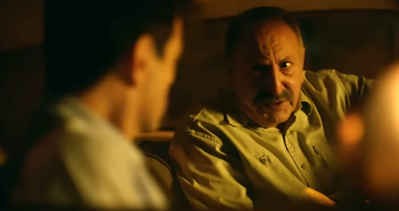perhaps the truth
by Douglas Messerli
Shimon Kabili (screenwriter and
director) The Way Out / 2017 [25 minutes]
This US film, based on true events,
tells a story about a Mexican vacation, filmed in Israel with a mostly Israeli
cast.
He and his family appear to be nearly perfect, except for a very
important matter that he has evidently long been hiding. Ryan is deeply in love
with an Argentinian national, a male name Ariel (Nir Zelichowski) who is living
illegally in Mexico. And in that regard, we immediately recognize this film as
sharing issues that were raised, without the wife’s point of view, in Todd
Haynes’ 2002 feature film Far from Heaven.
Moving in and out of time, the film shows him with his wife revealing
that their sexual relationship has changed, he rejecting her sexual advances.
And yet we glimpse his moments of love and happiness with is children.
But the most moving scene is the one in which, in the middle of the
night and after sneaking out of his bed where Natalie lays sleeping, Ryan and
Ariel meet up on a derelict side street. It is clear that his love for Ariel is
far deeper than any love making he might be able to revive in his heterosexual
relationship.
How long his homosexual activity has been going on or whether or not it
has involved only Ariel is never revealed. But for any of us who have observed
closeted heterosexuals in their attempts to find sexual fulfillment it is a
sadly familiar story, as the head-over-heels in love Ryan must block out most
of his life and his moral commitment to it for a few moments of pleasure.
This story might have ended in a kind of
cyclic pattern—after being freed with the payment, the husband returning to
pretend his joyful embracement of the family—were it not that writer / director
Shimon Kabili takes it in an odd direction.
The police chief begins by describing his Playa community as being
religious and traditional with regard to marriage and family. He too had a son
Miguel, he tells his prisoner, who people saw go into “a dice club,” where
tourists go. He admits that he couldn’t accept it, being a great sin in his
family and in response, he expelled his son from his home and refused to talk
with him after, despite his wife’s constant attempts to convince him to change
his mind along with his son’s attempts to resume their relationship. “I didn’t
want to hear.”
He takes out a photo of his son from his
billfold and shows it to Ryan. After a long pause, he continues: “He killed
himself. …I wanted him to live my way. Now he doesn’t live at all. Not my way
or any way.”
This is a very touching scene which we
recognize as the only moral message possible in this film. But we have some
confusion, obviously, about where his confession is going? Obviously he is
heartbroken over his rejection of his son, his inability to accept him for who
he was. But what is he suggesting for the man trapped in his car? Like Ryan, we
want to ask, “Where are we going?”
As Juan removes the prisoner’s
handcuffs, before driving him on, he finishes up with a piece of advice: “I
hope you understand what you are doing.”
And now we can begin comprehend his
meaning. Ryan himself, in this case, is both Juan and his son, a man torn in
two, the one refusing to permit the other to live his life as he must. Death is
imminent unless he makes a choice to find “the way out” of the bind in has put
himself in.
This excellent work doesn’t provide us
with the answer to what this troubled man decides. All we see is his return to
the early twilight hotel rooms, watching briefly wander the rooms in his torn
shirt and his bloodied lip, after an absence surely noticed by his wife. He
checks in on his children, closing the door tight before moving on into his
bedroom, sitting down upon the bed and shaking his wife awake with an assured
voice speaking her name “Natalie.”
Let me just suggest, it does not sound
like he is about to cry out in a complex lie of how what has happened to him is
the cause of a terrible mistake, but rather that he has something to share with
her. Just perhaps the truth.
Los Angeles, August 31, 2022 | Reprinted from My Queer Cinema Blog (August 2022).






No comments:
Post a Comment